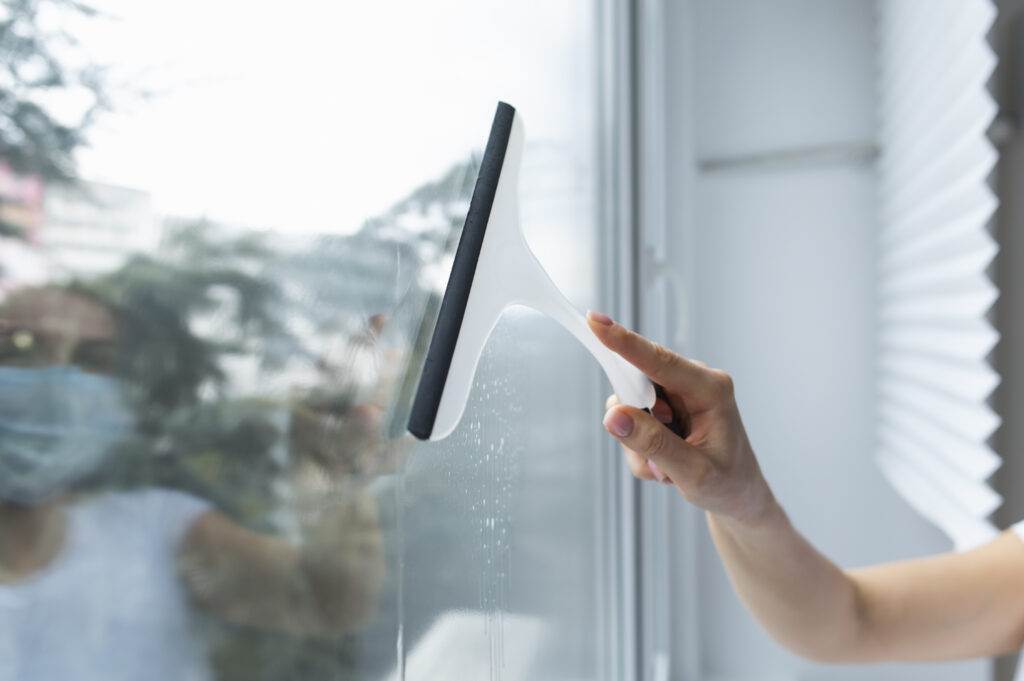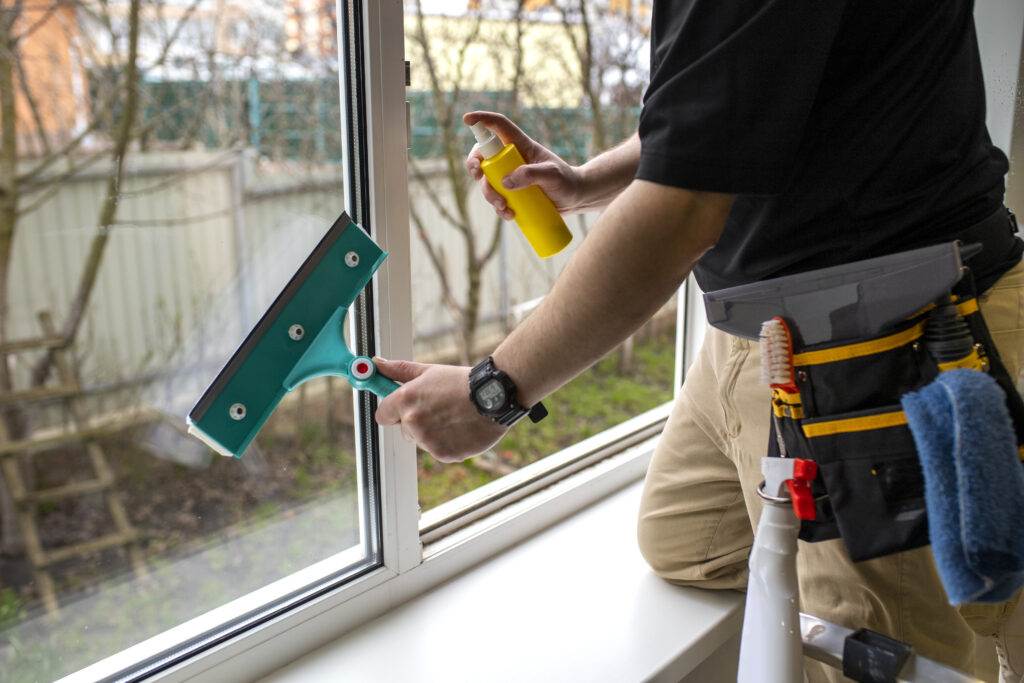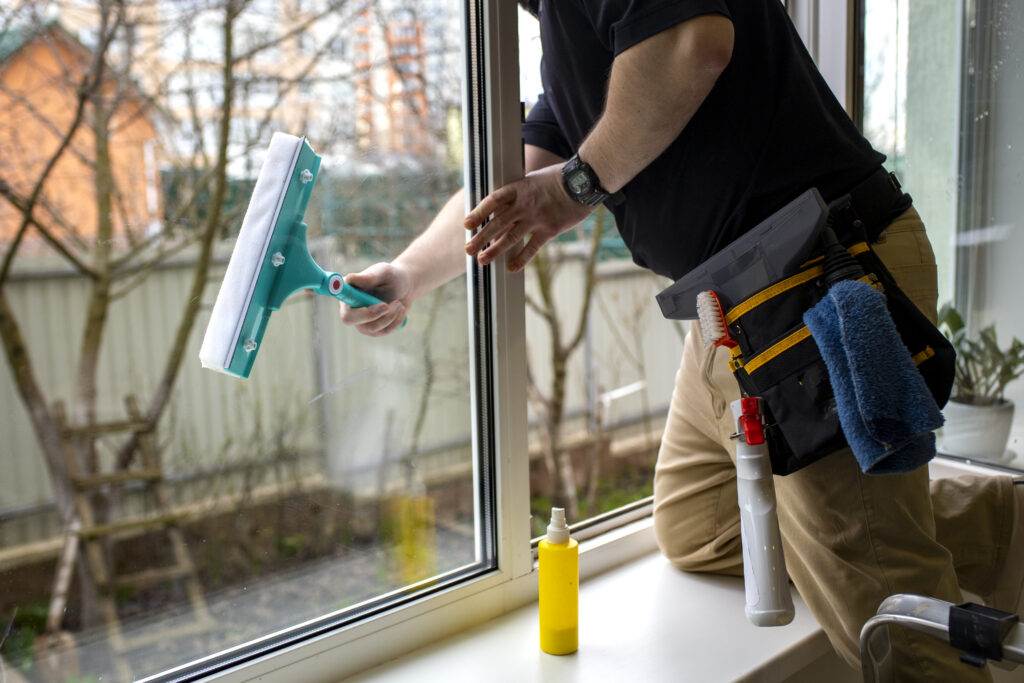Introduction
As businesses strive to establish a professional and inviting atmosphere, the appearance of their premises plays a critical role in their image. One often overlooked aspect of this is the state of their windows. Clean windows not only enhance the overall aesthetic appeal but also contribute significantly to customer perception and trust. In this blog, we will discuss the importance of clean windows for businesses and the valuable role that professional window cleaning services play in maintaining this crucial aspect of business appearance.

Importance of Clean Windows for Businesses
For any business, first impressions are paramount. Potential customers are likely to form opinions about a company’s professionalism and attention to detail based on the cleanliness of its windows. Dirty, streaked, or smudged windows can create a negative perception and deter clients from entering the establishment. Furthermore, clean windows allow ample natural light to enter, thereby creating a more inviting and pleasant atmosphere for both employees and clients. Regular window cleaning is essential for maintaining this environment, as it reflects the organization’s commitment to cleanliness and quality.
Role of Professional Window Cleaning Services
Hiring professional window cleaning services can significantly alleviate the burden on business owners. These experts have the right tools, techniques, and training to thoroughly clean windows without causing damage. Professional services ensure that windows are cleaned streak-free, improving aesthetics and prolonging the lifespan of window materials. Moreover, outsourcing this task allows business owners to focus on core operations while ensuring that their building remains visually appealing. In conclusion, investing in clean windows through professional services is a smart strategy that promotes both customer appeal and long-term success.
Enhanced Curb Appeal
Impact of Clean Windows on First Impressions
In the competitive landscape of business, first impressions have a lasting impact.Clean windows dramatically influence how a company is perceived by potential customers. When individuals encounter a building with spotless and clear windows, they inherently associate that cleanliness with the quality of service or products offered within. This positive association encourages foot traffic, as people are more likely to enter a business that exhibits an attention to detail, creating an inviting environment. Conversely, dirty or neglected windows can evoke doubts regarding the overall nature of the business, leading to missed opportunities for engagement and sales.
Attracting More Customers
Having a pristine exterior can be a game changer for any organization. Clean windows not only enhance a business’s facade but also play a significant role in attracting potential customers. A well-maintained appearance fosters trust and sets a standard of professionalism, which can significantly influence consumer behavior. A well-kept storefront, including streak-free windows, captivates passersby and entices them to explore the services offered inside. Furthermore, clean windows allow the light to shine through, showcasing the interior ambiance and products, ultimately creating a welcoming space that appeals to customers. For business owners, maintaining clean windows can serve as a strategic marketing tool that helps establish a positive reputation and encourages customer loyalty. Investing in professional window cleaning services ensures that these surfaces always shine, reinforcing the overall image and brand perception of the business.
Improved Employee Productivity



Benefits of Natural Light
Natural light is a powerful contributor to workplace productivity. When businesses invest in clean windows that allow ample daylight to flood their interiors, they create an uplifting and energizing atmosphere for employees. Studies have shown that exposure to natural light can enhance mood, decrease fatigue, and bolster focus, which directly translates into increased productivity. Employees are more likely to feel motivated and engaged in their tasks when they have a pleasant environment that reduces eye strain compared to artificial lighting. Clean windows not only improve aesthetics but also allow maximum light penetration, fostering an inspiring work setting.
A clean workplace is inherently linked to employee well-being. Maintaining spotless windows contributes to a healthier environment by minimizing dust and allergens that accumulate on dirty surfaces. This focus on cleanliness promotes better air quality, ultimately benefiting the health of employees. In a climate of heightened awareness around hygiene, businesses that prioritize cleanliness are seen as responsible and caring towards their workforce. Such an environment can reduce the prevalence of sick days, leading to a more stable and productive staff. By ensuring windows are regularly cleaned and well-maintained, companies not only enhance the aesthetic appeal of their workspaces but also cultivate a culture of health and well-being, demonstrating their commitment to employee satisfaction and productivity. This strategic investment pays dividends in the form of higher morale and stronger organizational performance.
Creating a Healthy Work Environment
A clean workplace is inherently linked to employee well-being. Maintaining spotless windows contributes to a healthier environment by minimizing dust and allergens that accumulate on dirty surfaces. This focus on cleanliness promotes better air quality, ultimately benefiting the health of employees. In a climate of heightened awareness around hygiene, businesses that prioritize cleanliness are seen as responsible and caring towards their workforce. Such an environment can reduce the prevalence of sick days, leading to a more stable and productive staff. By ensuring windows are regularly cleaned and well-maintained, companies not only enhance the aesthetic appeal of their workspaces but also cultivate a culture of health and well-being, demonstrating their commitment to employee satisfaction and productivity. This strategic investment pays dividends in the form of higher morale and stronger organizational performance.
Extending the Lifespan of Windows



Preventing Damage and Corrosion Avoiding Costly Repairs
Regular window cleaning plays a vital role in preventing damage. Over time, dirt, grime, and other environmental pollutants can lead to corrosion and deterioration of window materials, especially for metal and wooden frames. By ensuring windows are cleaned frequently and thoroughly, businesses can protect their investments. Clean windows not only maintain transparency but also prevent the build-up of harmful substances that could eat away at frames, seals, or glass surfaces. This proactive approach minimizes the risk of extensive damage, contributing to the longevity of the windows in an office environment.
Investing in routine maintenance is a financially savvy decision. The cost of repairing or replacing damaged windows can be significantly higher than the expenses associated with regular cleaning. By addressing the maintenance needs of windows before they become problematic, businesses can avoid incurring unanticipated repair costs. Clean and well-maintained windows enhance energy efficiency by ensuring seals are intact, thus preventing drafts and minimizing heating or cooling expenses. Moreover, a transparent view permits natural light to warm spaces, reducing reliance on heating systems. In sum, extending the lifespan of windows through consistent cleaning not only preserves aesthetic appeal but also safeguards financial resources. A clean window is a signal of professionalism and care, reinforcing a commitment to quality in the workplace. By prioritizing maintenance, organizations demonstrate their attention to detail and ensure a long-term return on investment.
Avoiding Costly Repairs
Investing in routine maintenance is a financially savvy decision. The cost of repairing or replacing damaged windows can be significantly higher than the expenses associated with regular cleaning. By addressing the maintenance needs of windows before they become problematic, businesses can avoid incurring unanticipated repair costs. Clean and well-maintained windows enhance energy efficiency by ensuring seals are intact, thus preventing drafts and minimizing heating or cooling expenses. Moreover, a transparent view permits natural light to warm spaces, reducing reliance on heating systems. In sum, extending the lifespan of windows through consistent cleaning not only preserves aesthetic appeal but also safeguards financial resources. A clean window is a signal of professionalism and care, reinforcing a commitment to quality in the workplace. By prioritizing maintenance, organizations demonstrate their attention to detail and ensure a long-term return on investment.
Increased Energy Efficiency

Importance of Well-Maintained Windows
A significant aspect of window maintenance is its impact on energy efficiency.Well-maintained windows play a crucial role in regulating indoor temperatures, which can greatly affect a business’s overall energy consumption. When windows are clean and intact, they allow natural light to permeate spaces, reducing the reliance on artificial lighting and, consequently, energy usage. Furthermore, properly functioning windows—those free from cracks, peeling paint, and damaged seals—contribute significantly to building insulation, ensuring that conditioned air remains within the premises much longer. This phenomenon translates into less pressure on heating and cooling systems, allowing them to operate optimally and conserve energy.
Reducing Heating and Cooling Costs
Maintaining clear and well-insulated windows directly correlates with reduced energy costs. Drafty or poorly sealed windows can lead to substantial energy losses, prompting heating and air conditioning systems to work overtime. This translates into higher utility bills for businesses. By engaging in regular window cleaning and inspections, companies can identify and address potential problems proactively, ensuring that all windows are functioning effectively. Investments in maintenance today can lead to significant savings in energy costs over time. Additionally, energy-efficient windows, which are often a part of modern architectural designs, require vigilant care to maintain their functionality. In conclusion, prioritizing window upkeep results not only in aesthetic benefits but also in tangible financial savings, underlining the importance of a comprehensive maintenance strategy for both short-term impacts and long-term sustainability.
